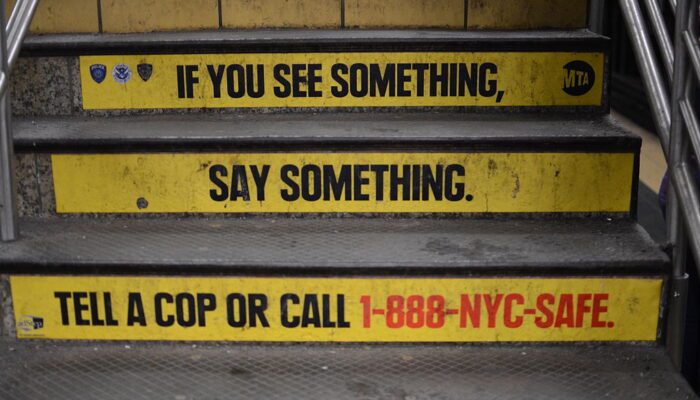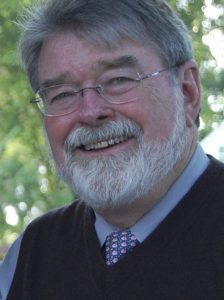
If You See Something, Say Something

(Photo by Steven Lek via Wikimedia Commons)
By Patrick Anderson, Editor
Luke 23:34a & 35a (RSV): And Jesus said, “Father, forgive them; for they know not what they do… 35 And the people stood by, watching; but the rulers scoffed at him…
After the destruction of the events of September 11, 2001, the Department of Homeland Security provided signs that were hung in every airport and other public places which said “If You See Something, Say Something.”
In hindsight, investigators concluded that sufficient evidence of the impending airplane attacks had existed, but people who had witnessed those signs at the time did not treat them with the urgency that could have prevented the deaths of so many Americans on that bright, cool September morning. Of course, warning signs that appear in hindsight tend to be much more obvious than when seen beforehand.
This Scripture text from the Gospel of Luke is a familiar text that Christians read and hear most often during the season of Holy Week. The first part in verse 34a, “Father, forgive them; for they know not what they do” is well-known and oft-repeated. Jesus was addressing the religious folks, the Pharisees and chief priests, who jeered and laughed at him as he hung on the cross.

Some of those same religious folks had been trolling Jesus for months, trying to catch him on matters of his diet, on which day of the week was sacred, and on to whom a widow who remarried on earth would be married in heaven. They really did not know what they were doing. All they knew was that their political, financial and ecclesiastical dominance was threatened by Jesus.
The Gospel writers give us a great deal of detail about the brutality, the harsh treatment, the taunting and spitting from the crowd. And we accept without much consideration that Jesus, in an intercessory prayer, asked Father God to forgive them.
But the next verse, verse 35a, at least in my experience, does not attract as much notice. Luke says “And the people stood by, watching.” The silence of the friends, family and followers of Jesus along with “moderate” Jewish and other observers spoke volumes as they just stood there, saying nothing, just watching. Sufficient evidence of this tragic scene was well-known. The prophets of old had foretold it and Jesus himself had talked about it. The entire episode had been slowly worked out for days as the religious leaders and Roman authorities conspired to kill Jesus.
And the people stood by, watching.
Martin Niemöller
I am reminded of Martin Niemöller, a decorated former WWI German U-Boat Commander and a lifelong member of the largest German Protestant denomination, the Lutheran Evangelicals, in which his father was a prominent minister. He resigned from the military shortly after his wartime heroics and entered seminary. Martin, like most Protestant pastors, was a national conservative, having been raised in a very conservative home. He voted for Nazis in 1924, 1928, and 1933. He welcomed Hitler’s accession to power in 1933, believing that it would bring a national revival. Martin Niemöller was a militarist antisemite who responded to Hitler’s call of “national regeneration”— Nazi Germany’s own version of MAGA. When later asked by his cellmate at Dachau Concentration Camp about why he had supported the Nazi Regime, Niemöller said:
I wonder about it as much as I regret it. Still, it is true that Hitler betrayed me. I had an audience with him, as a representative of the Protestant Church, shortly before he became Chancellor, in 1932. Hitler promised me on his word of honor, to protect the Church, and not to issue any anti-Church laws. He also agreed not to allow pogroms against the Jews, assuring me as follows: “There will be restrictions against the Jews, but there will be no ghettos, no pogroms, in Germany.” I believed him…. I am paying for that mistake now; and not me alone, but thousands of other persons like me.”
As Hitler’s attacks shifted from Jews, Gypsies and homosexuals toward the Protestants, Niemöller turned against the regime and spoke out publicly against fascism, while still holding on to his antisemitic views. In 1937, as he became more agitated and outspoken about fascist Nazism, he was arrested, tried and shipped off to spend the next eight years in concentration camps. He suffered in Dacau until he was rescued by Allied soldiers who freed the concentration camp prisoners in 1945, just a few weeks after another Christian minister, Dietrich Bonhoeffer, was hanged as a prisoner of the Gestapo.
After the war, in the fall of 1945, Martin Niemöller and his wife, Else, visited Dachau. He showed his wife the cell in which he had been confined for so many months; they passed the crematorium where a great white-painted board had been affixed to a tree. On it, in black letters, they read: “Here between the years 1933 and 1945, 238,756 human beings were incinerated.”
At that moment, Niemöller would later tell his audiences in numerous speeches, sermons and lectures for the rest of his life, the consciousness of his own guilt and his own failure assailed him as never before.
“And God asked me… ‘Man, where wast thou in those years 1933 to 1945?’ I knew I had no answer to that question. True, I had an alibi in my pocket, for the years 1937 to 1945, my identity disc from the concentration camp. But what help to me was that? God was not asking me where I had been from 1937 to 1945… and for the years 1933 to 1937, I had no answer.”
The most famous words of Martin Niemöller are these:
First they came for the Communists, and I did not speak out—
Because I was not a Communist.
Then they came for the social democrats, and I did not speak out—
Because I was not a social democrat.
Then they came for the trade unionists, and I did not speak out—
Because I was not a trade unionist.
Then they came for the Jews, and I did not speak out—
Because I was not a Jew.
Then they came for me—
and there was no one left to speak for me.
And the people stood by, watching.
Martin Luther King Jr.
In 1963, the Reverend Martin Luther King, Jr., and several others were arrested and jailed in Birmingham, Alabama, on the charges of “parading without a permit.” This was neither the first nor last time Martin found himself in the custody of southern police. He was placed in a solitary cell where he obtained a copy of a public letter from Birmingham’s religious leaders, opposing the public protests about white supremacy and racial injustice. These church leaders—from Methodist, Episcopal, Presbyterian, Baptist, Catholic and Jewish traditions—advised that “when rights are consistently denied, a cause should be pressed in the courts and in negotiations among local leaders, and not in the streets.”
In response, King wrote what became, alongside Abraham Lincoln’s second inaugural address, one of the finest examples of moral justification for the equality of humans. His immediate situation in a jail cell led him to address the complicity of White Christians in the awful sin of racial injustice. In that letter he wrote:
“In the midst of blatant injustices inflicted upon the Negro, I have watched white churchmen stand on the sideline and mouth pious irrelevancies and sanctimonious trivialities…
“When I was suddenly catapulted into the leadership of the bus protest in Montgomery, Alabama, a few years ago, I felt we would be supported by the white church. I felt that the white ministers, priests and rabbis of the South would be among our strongest allies. Instead, some have been outright opponents, refusing to understand the freedom movement and misrepresenting its leaders; all too many others have been more cautious than courageous and have remained silent behind the anesthetizing security of stained glass windows. …
“If today’s church does not recapture the sacrificial spirit of the early church, it will lose its authenticity, forfeit the loyalty of millions, and be dismissed as an irrelevant social club with no meaning for the twentieth century. Every day I meet young people whose disappointment with the church has turned into outright disgust.”
Martin Niemöller in fascist Germany and Martin Luther King, Jr. in Jim Crow America saw something wrong in their cultures and in the church. Niemöller saw something mostly in retrospect, remained mostly silent, and lived to the age of 92 in reflection, remorse, and repentance. King experienced and opposed what he saw while it was happening and was a victim, his life ended by a murderer’s bullet at the age of 39. Upon seeing something, they said something; they did something. One was on the scene, sharing the unjust treatment, and died young; the other was on the scene but did not share the injustice and waited too long to speak up and act out.
Persecuted people organize their faith around encountering God in their struggles for freedom and justice in the here and now and in doing so, they cannot just stand by and watch. Traditional theologians and church leaders tend to extol the vision of the hereafter, looking for freedom and justice in the afterlife while silently watching in the here and now. They tout fantastical propositions of narrowly defined theological orthodoxy while misunderstanding the prayer so often recited, “Thy kingdom come, Thy will be done, on earth as it is in heaven.”
As I see it, the biggest challenge we face in the white church is the impulse many of us white Christians have to avoid conflict at any cost and by any means necessary. The white church has long been told that social problems, political issues and controversial subjects do not belong in church, and need not be discussed in holy places. We must not divide the church is the mantra. But the message of Jesus of Nazareth is to do exactly that. The acceptance of a white supremacist, capitalist patriarchy, with the threat of violence to force compliance from those who suffer under that narrative, is considered orthodox, normal and ideal.
Meanwhile Jesus aligns himself with the poor, the dispossessed and the marginalized and against such political and ecclesiastical domination and superiority.
— Dr. Patrick Anderson is editor of Christian Ethics Daily.
Leave a Reply
You must be logged in to post a comment.


